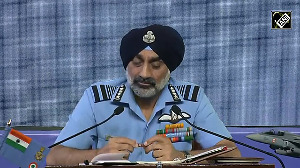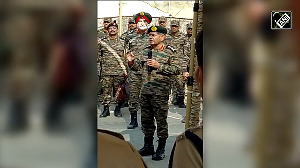Continuing to seek Congressional support to the "path-breaking" Indo-US nuclear agreement, Secretary of State Condoleezza Rice has said the deal has to be seen in the context of the burgeoning bilateral cooperation in military, agriculture and private sector.
"This agreement is a path-breaking and really very important agreement because India is an anomaly in international politics. It is a country that never signed Non Proliferation Treaty, did develop nuclear weapons, but did so of course, having never signed the NPT. It has been cut off as a result of those decisions from any kind of civil nuclear cooperation with rest of the world," she said at Chicago Council on Foreign Relations Wednesday.
Setting forth the reasons why Washington wants to change this "anomaly," Rice said, "First of all, because the US needs good strategic partners around the world who are democratic, and India is a huge multi-ethnic, multi- religious democracy that is transparent and can play an extremely important role in the world as a strategic partner, a responsible strategic partner. And so we see this broad relationship that is now burgeoning in agriculture and in military-to-military cooperation, and across the board cooperation between the private sector and business. We see this agreement in that context," she said.
Noting that India was "desperate to fuel economic growth at 8 per cent, 9 per cent," she said it would need to diversify energy to clean technologies like nuclear energy.
"We cannot begin to share those technologies with India without an agreement of this kind," she said.
Rice also said India has lived up to its obligations not to transfer nuclear technology around the world, though it did not sign the NPT. "It has a really very good record. Moreover, no less than Mohamed ElBaradei, who is the director general of the International Atomic Energy Agency, which is the agency that protects, in a sense, the NPT, supports this agreement because while it doesn't bring India into the NPT, it does bring India into the broad non-proliferation regime. India has agreed to put its civilian reactors under international safeguards," she said.
Asked if Bush administration was not creating double standards in agreeing to India on civilian nuclear front and if the arguments for North Korea and Iran became weaker because of it, she said, "Absolutely, there's a double standard and Iran and North Korea created it by cheating on their obligations to the NPT, by being non-transparent, closed societies where everybody worries about what they're doing."
"Here, you have a democracy in India that is trying to move closer to the non-proliferation regime and we ought to support that. I believe that we will -- I hope that we will get Congress' support (to the deal)," Rice said. "I, myself, testified a couple of weeks ago and we're continuing to seek support for it, but you have to understand it in that broad framework, not just as an agreement on civil nuclear power, but it's a very important agreement in the broader sense as well," she added.





